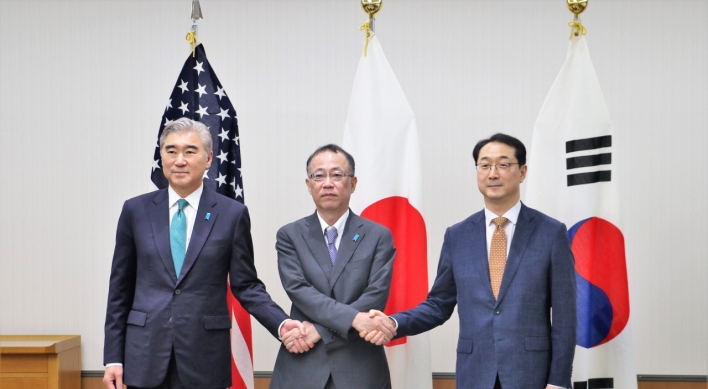Korea to promote investment in foreign stocks, M&As
By Korea HeraldPublished : May 17, 2015 - 20:40
The Finance Ministry is considering increasing tax benefits for domestic investors in foreign stocks and funds in a reported bid to resolve problems from the Korean won’s strong position against major currencies, government sources said Sunday.
According to some government officials, the ministry, in consultation with the Financial Services Commission, will come up with a comprehensive plan to increase investments by institutional and small investors in overseas stocks and bonds. Further, Korean companies and state funds are advised to actively bid in global mergers and acquisitions.
It is the first time in eight years since policies on investments abroad were revised. In 2007, the government came up with a policy to not tax profit margins from foreign stocks for three years, resulting in a boom in investments in foreign funds.
The government plans to reduce the current account surplus, which amounts to about $100 billion yearly, to deal with the rising value of the won against the U.S. dollar and the Japanese yen and the subsequent decrease in exports of automobiles.
While a rising current account surplus is usually good for the economy, an excess of it could cause the local currency to appreciate rapidly and decrease the amount of exports due to lowered price competitiveness, which is a problem for export-oriented economies such as South Korea.
Experts said low interest rates in Korea had resulted in there being few ways to earn profits other than foreign investments, and the government is also looking for ways to simplify its policies on investing in foreign funds, which have long been criticized for being more complicated than investing in local funds.
Directly investing in local funds only costs a stock exchange tax (0.3 percent), but for overseas investments one needs to pay a transfer tax from profit margins (22 percent), as well as income tax for dividends (15.4 percent) and other additional fees.
There are talks on making separate taxation and foreign-exchange profit fairer when investing in foreign funds in order to remedy the situation.
The government is also coming up with plans to increase overseas M&As by relaxing restrictions and increasing foreign investment in public sectors.
The new plans will be included in the government’s economic policy directions for the second half of the year, to be announced in June.
By Sang Youn-joo & news reports (sangyj@heraldcorp.com)
According to some government officials, the ministry, in consultation with the Financial Services Commission, will come up with a comprehensive plan to increase investments by institutional and small investors in overseas stocks and bonds. Further, Korean companies and state funds are advised to actively bid in global mergers and acquisitions.
It is the first time in eight years since policies on investments abroad were revised. In 2007, the government came up with a policy to not tax profit margins from foreign stocks for three years, resulting in a boom in investments in foreign funds.
The government plans to reduce the current account surplus, which amounts to about $100 billion yearly, to deal with the rising value of the won against the U.S. dollar and the Japanese yen and the subsequent decrease in exports of automobiles.
While a rising current account surplus is usually good for the economy, an excess of it could cause the local currency to appreciate rapidly and decrease the amount of exports due to lowered price competitiveness, which is a problem for export-oriented economies such as South Korea.
Experts said low interest rates in Korea had resulted in there being few ways to earn profits other than foreign investments, and the government is also looking for ways to simplify its policies on investing in foreign funds, which have long been criticized for being more complicated than investing in local funds.
Directly investing in local funds only costs a stock exchange tax (0.3 percent), but for overseas investments one needs to pay a transfer tax from profit margins (22 percent), as well as income tax for dividends (15.4 percent) and other additional fees.
There are talks on making separate taxation and foreign-exchange profit fairer when investing in foreign funds in order to remedy the situation.
The government is also coming up with plans to increase overseas M&As by relaxing restrictions and increasing foreign investment in public sectors.
The new plans will be included in the government’s economic policy directions for the second half of the year, to be announced in June.
By Sang Youn-joo & news reports (sangyj@heraldcorp.com)
-
Articles by Korea Herald










![[New faces of Assembly] Architect behind ‘audacious initiative’ believes in denuclearized North Korea](http://res.heraldm.com/phpwas/restmb_idxmake.php?idx=644&simg=/content/image/2024/05/01/20240501050627_0.jpg&u=20240501225745)
![[Music in drama] Rekindle a love that slipped through your fingers](http://res.heraldm.com/phpwas/restmb_idxmake.php?idx=644&simg=/content/image/2024/05/01/20240501050484_0.jpg&u=20240501151646)







